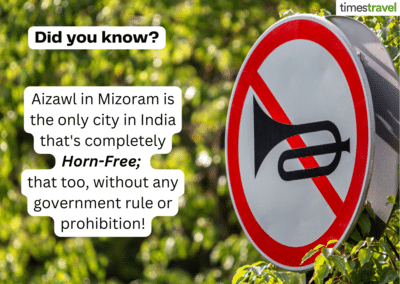Everyday life in most Indian cities means dealing with traffic jams, and honking sounds in the background. This noise has almost become a reflexive action to impatience and congestion on the road. While this holds true to most of the cities in India, there is one place where cars move in discipline, and no noise of honking iān the background. It’s this beautiful place in the Northeastern part of the country, Aizawl, the capital of Mizoram that has earned widespread praise for this surprising reason, and this is, there’s virtually no honking here.
Despite its compact size, Aizawl’s narrow roads see vehicles moving past in order and authority. There are no jam-packed intersections blaring horns or drivers racing for position. Instead, Aizawl’s traffic runs at a silent pace, which also shows respect and discipline.
So how did this place manage to achieve this, or what’s the secret behind this hushed urban rhythm? It’s not heavy-handed enforcement or a government crackdown. Surprisingly, it’s a collective social norm. Locals rarely honk unnecessarily, they wait their turn patiently, and overtaking in narrow lanes is uncommon. Over time, this etiquette solidified into a community-wide practice.

Videos of Aizawl’s traffic behavior, cars and two-wheelers maintaining lanes without markings, without honks, have time and again sparked fascination across social media.
Even national leaders have taken note. Former President Ram Nath Kovind praised Aizawl’s no-honking culture, suggesting other cities ought to learn from this model at the Mizoram University convocation.
Read more: 5 Weekend Getaways from Bengaluru Within 100 km
What makes Aizawl’s approach stand out isn’t just its tranquility, but how organically it evolved. With over 50% urbanisation, rising vehicle ownership, and tight topography, Aizawl had few options for sprawling roads or aggressive traffic solutions. So the city turned to civic intelligence and courtesy to keep chaos at bay.
The benefits ripple outward: the absence of incessant honking dramatically reduces noise pollution, a serious health hazard linked to stress, hearing loss, and heart issues. For visitors, the result is serene roads, a sense of safety, and travel through a city that encourages reflection rather than reaction.
Read more: 5 hill stations with nonstop flights from Delhi
In a country where traffic clamor has become a signal of urban life, Aizawl offers a refreshing counterpoint. It proves that cityscapes don’t need to be in battles for space, but opportunities for cooperation. As India’s only, and most peaceful, urban traffic experiment, Aizawl lets vehicles glide, whispers replace horns, and respect remains the loudest signal on the road.
Despite its compact size, Aizawl’s narrow roads see vehicles moving past in order and authority. There are no jam-packed intersections blaring horns or drivers racing for position. Instead, Aizawl’s traffic runs at a silent pace, which also shows respect and discipline.
So how did this place manage to achieve this, or what’s the secret behind this hushed urban rhythm? It’s not heavy-handed enforcement or a government crackdown. Surprisingly, it’s a collective social norm. Locals rarely honk unnecessarily, they wait their turn patiently, and overtaking in narrow lanes is uncommon. Over time, this etiquette solidified into a community-wide practice.
Videos of Aizawl’s traffic behavior, cars and two-wheelers maintaining lanes without markings, without honks, have time and again sparked fascination across social media.
Even national leaders have taken note. Former President Ram Nath Kovind praised Aizawl’s no-honking culture, suggesting other cities ought to learn from this model at the Mizoram University convocation.
Read more: 5 Weekend Getaways from Bengaluru Within 100 km
What makes Aizawl’s approach stand out isn’t just its tranquility, but how organically it evolved. With over 50% urbanisation, rising vehicle ownership, and tight topography, Aizawl had few options for sprawling roads or aggressive traffic solutions. So the city turned to civic intelligence and courtesy to keep chaos at bay.
The benefits ripple outward: the absence of incessant honking dramatically reduces noise pollution, a serious health hazard linked to stress, hearing loss, and heart issues. For visitors, the result is serene roads, a sense of safety, and travel through a city that encourages reflection rather than reaction.
Read more: 5 hill stations with nonstop flights from Delhi
In a country where traffic clamor has become a signal of urban life, Aizawl offers a refreshing counterpoint. It proves that cityscapes don’t need to be in battles for space, but opportunities for cooperation. As India’s only, and most peaceful, urban traffic experiment, Aizawl lets vehicles glide, whispers replace horns, and respect remains the loudest signal on the road.
You may also like

Haryana govt evaded direct reply to Oppn's questions in Assembly, says Hooda

Alan Shearer's blunt response to Man Utd's chaotic Grimsby defeat

Russia attack LIVE: Fuming Lammy summons Russian ambassador as Starmer reacts to strike

Himachal High Court warns contractor over delay in Kupvi Health Centre Project, orders completion in two months

Nigel Farage faces fury after Reform UK's chilling Trump-esque local media ban






